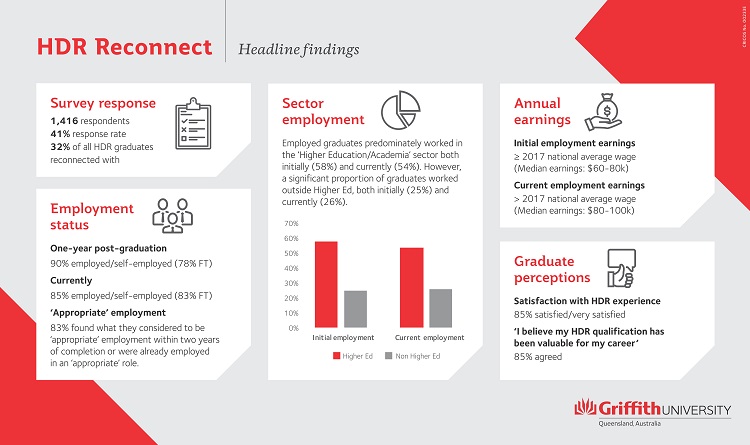Dr Ruth Kamrowski, Dr Sharon Saunders and Professor Sue Berners-Price
Project Officer, Director and Dean of Griffith Graduate Research School (GGRS), Griffith University.
The team from GGRS explain why graduate research in Australia is a good investment and that there are likely to be more benefits from the recent and continued improvements to Australia’s research training system.
Nearly five years after the ACOLA Review of Australia’s Research Training System (2016) highlighted much needed changes, numerous initiatives have been implemented across the sector, transforming and strengthening Australia’s research training system. However, as Professor McEwan points out, ‘the greater challenges lie ahead [relating] to […] understanding of the role of research and researchers in all sectors of national activity’. So how can we effectively demonstrate the value of graduate research to the nation?
One key finding of the ACOLA Review was the inadequacy of research graduate outcomes data. At the time of the review, outcomes data were limited to the PREQ, ‘Postgraduate Destinations’ and ‘Beyond Graduation’ surveys, as well as ABS census data (all of which were limited by sample size and/or point-in-time data). Longitudinal graduate outcomes data was emphasised as essential, since without comprehensive data, the performance of the graduate research system and any improvements to the sector become extremely difficult to demonstrate.
From 2016, the ‘Graduate Outcomes Survey’ (4 months post-completion) replaced the PREQ; this has since been supplemented by the ‘Graduate Outcomes Survey – Longitudinal’ (GOS-L; conducted 3 years post-completion). These surveys include salaries and employment rates and are valuable for demonstrating some research graduate outcomes. However, there remains a lack of information detailing outcomes in terms of career destinations and pathways: information of huge benefit to both prospective and current graduate researchers, as well as for awareness raising among potential employers outside the higher education sector.
There is widespread acknowledgment that a research degree can no longer be considered solely as the first step on an academic career path—there are simply not enough academic positions available for current graduate researchers, a fact that will undoubtedly become even more relevant given the impact of the COVID-19 pandemic on the university sector. While institutions have responded by increasingly recognising the importance of employability and professional development in research training, providing real-world examples of non-traditional career pathways has become critical for prospective and current research students who may be questioning the value of undertaking or completing a research degree in the face of post-COVID employment. Showcasing such pathways may also assist ‘industry’ organisations looking for innovative ways to adapt their operations post-pandemic (describing, as Professor McEwan does, ‘industry’ in its broadest sense).
In 2017 and 2018, Griffith University conducted an Australian-first survey of as many of our Higher Degree by Research (HDR) graduates as we could find, to gather employment outcomes data and determine graduate satisfaction regarding the value of their qualification (see our ‘HDR Reconnect Project’ for more information and to explore project results via an interactive dashboard).
Overwhelmingly, our data demonstrated positive employment outcomes for research graduates and has proven to be extremely valuable for informing internal strategic and operational objectives. We also know this data has been used by prospective candidates, with web analytics indicating a spike in visits to the project website during the 2019 peak recruitment period for applications. Yet, the most beneficial outcome for Griffith has been allowing us to demonstrate, with evidence, the value of undertaking a research degree. Most of our graduates strongly believe that their qualification has been valuable for their career and our data indicates that a significant proportion of our graduates have successfully pursued careers outside academia. Our data further indicates that research graduates earn better salaries than individuals completing undergraduate degrees and also that those salaries significantly increase over time.

In a recent piece in The Australian, Professor Mario Pinto, Griffith DVC Research, outlined the enormous economic and social benefits that university activity delivers for Australia. He highlighted research from LH Martin Institute (based on the Grattan Institute’s report) which indicated that, on average, a university graduate is expected to pay an additional $A400,000 in taxes across their lifetime, compared to a worker without a university education. Given our data demonstrating that research graduates earn significantly higher salaries than graduates with undergraduate degrees, at the very least we can extrapolate that a research graduate will typically pay more than $A400,000 in taxes across their lifetime. Griffith have graduated ~5000 research graduates since the late 1970s, and Dobson (2012) calculates that between 1948 and 2009 more than 94,000 PhDs had been awarded in Australia, with this number increasing substantially every year. This unequivocally emphasises the economic value of research training to Australia, particularly given that since the introduction of demand driven funding between 2012 and 2017, where close to 40% of the population were studying for a university qualification, the ‘additional’ tax premium from university graduates is likely to decrease.
Moreover, Professor Pinto called attention to the fact that 37% of all research students are international and that many of these elect to stay on and work in Australia upon completion. Our data supports this, with 54% of our graduates, who completed their research degrees as international candidates, currently working and contributing to the Australian economy. The COVID-19 pandemic has highlighted the huge importance of international students to the Australian economy. A conservative estimate made by Universities Australia of total university revenue lost in 2020 sits between $3 billion and $4.6 billion due to reduced international student numbers. Our data suggest a potential ongoing problem for the nation: if we fail to attract international research students, we not only lose university revenue, but we stand to further lose the future social and economic contributions of these highly educated individuals.
The positive graduate research outcomes our data demonstrates are predominantly outcomes that existed before significant changes were made to Australia’s research training system. As we adapt to the new normal of a post-COVID future, there is increasing recognition that graduate researchers are both a ‘vital element of the global scientific effort’ (see Dr Finkel AO’s blog here) and an essential component of an ‘innovative future’ (see Anne Younger’s blog here). Continued improvements to the research training system which include a focus on employability within research training, alongside increased coordination between universities and industry, can only lead to improved graduate research outcomes, and ultimately advance Australia.
Photo by Caleb Woods on Unsplash

